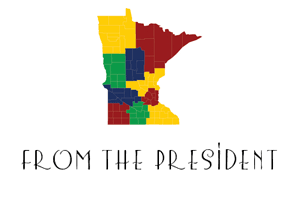As legislators enter the homestretch of session, update them
on barriers to accessing disability services
by This email address is being protected from spambots. You need JavaScript enabled to view it., president of the Minnesota Organization for Habilitation and Rehabilitation (MOHR)
As Minnesota legislators return on April 19 following their annual legislative spring break, they will be entering into the homestretch of this session. The Legislature must conclude their work by Monday, May 23, meaning there are only five weeks remaining for the House, Senate, and Walz Administration to try to find agreed-upon compromises on legislation. If compromise is not found, the Legislature can simply adjourn for the year, given that they set a two-year state budget in place last year.
Closures, waiting lists, need for long-term solutions
Our state’s current $9 billion surplus, combined with great needs in health and human services presents an opportunity for our legislators to come together and make critical investments before they adjourn this session, and we must continue to push them to do so. Group homes are closing, many people are on waiting lists to return to day and employment services or access them for the first-time, and we must find long-term solutions before the system simply implodes. This email address is being protected from spambots. You need JavaScript enabled to view it.
We are an interdependent system of services and supports that work together to ensure people with disabilities can engage in their communities and live their best lives.
There are still people who are unable to move forward with their lives, even two years after the pandemic began. They stayed home and have not yet returned to normal life. In a chain reaction, this causes enormous strain on group homes and families who are their caregivers. Without day and employment supports, individuals with disabilities are losing physical ground and cannot resume activities that help them stay healthy, learn, and thrive.
What can programs, families do?
Please reach out to your state legislators and provide them with a clear and current picture of the barriers to service access that your program is facing. Share updated information from your organization with your legislators on the number of individuals with disabilities waiting to start or come back to day and employment and services, the number of job openings you have, and the impact this has on the people who need services but cannot currently access them.
As legislators head into these final weeks of session, there will be many hard conversations and decisions about the long list of important and worthy health and human services needs that exist in our state right now. We need legislators to know that we understand they are being asked to address a number of important issues this session given how destabilizing the worker shortage and the pandemic have been for a wide variety of services in our state.
Invest in DSP wages, benefits now
However, our state is also currently facing a more than $9 billion budget surplus, and many of these issues are interrelated. Along with addressing other important needs, it is absolutely crucial that the legislature invest in wages and benefits for direct support professionals working in waiver-funded disability services - this session. Direct support professionals are a fundamental part of the services that support many people with disabilities in Minnesota to live their best lives. The state must take action to support paying these critical staff a livable wage. Without this, more and more people with disabilities throughout the state will be without access to meaningful day and employment opportunities.
